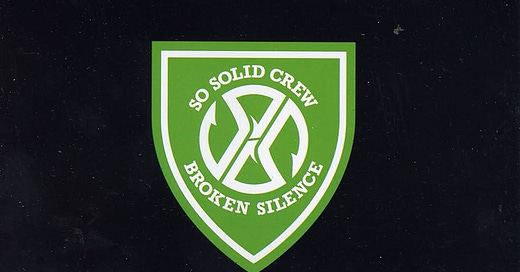Broken Silence - So Solid Crew (2003)
A heartfelt ode to the tragedy and resilience of inner-city life, by the collective who reinvented UK garage and therefore British music after the new millennium
As Christmas approached in 2001, So Solid Crew changed UK garage music forever with the release of their debut album, They Don’t Know. Its compilation of wobbly, futuristic beats and gritty, rapid-fire MCing pulled the British genre into darker depths as the early signs of grime’s takeover started to show, increasing violence reportedly broke out on dance floors, and the champagne dance-high of the 1990s became a distant memory.
Two years later, in 2003, they released a second album, 2nd Verse. In hindsight, its relative failure to hit expectations and the supergroup’s subsequent collapse pose a question for the longevity UK urban music in the 2000s. Could groups of underground artists responsible for pioneering a new sound by being rebellious sustain their rebellion as they commercialised? Was it possible? Perhaps not yet; though the success of grime elders like Ghetts, Flow Dan and Kano now suggest that more time was simply needed to perfect the formula.
Anyway, one song, Broken Silence, always stood out. It remains one of my favourites, a crutch I turn to when I’m slowing down. Its careful production — the delicate flute riff, steady bass line and choral harmony — and the piercing, hyperlocal social commentary of its lyricism make for an emotionally vulnerable and soulful style of British hip-hop that was, back then, still an unusual combination, but would within a couple of years become normalised in videos on Channel U and songs played on KISS.
At the time I was 12 and I’d just started year 8. Every day I would take the train to and from school in South West London, on the same line that passed Clapham Junction and Battersea, where I was loosely aware that So Solid hailed from. Broken Silence nudged my young mind to empathise with life in the geographically proximate but socially disparate community making it, allowing me to feel its artists’ anger, sadness and determination.
Earlier in the same year had seen the release of Black Eyed Peas’ mega hit ‘Where Is The Love?’. This was a much poppier, cheesier ode to feeling, existentialism and human rights. But it reflected a comparably moralising, melancholic nostalgia. The gangster rap, rave hedonism of the previous decade was a thing of the past. The new millennium was an anti-climax. The psychologies of a Western world caught in post-9/11 blues paved the way for self-reflection.
Also, it felt special to see a British South Asian man, Sef from The Reelists, who looked a bit like me, singing the hook (like he’d done on banger Haters two years earlier) — a rare example of representation in the creative industries doing its reassuring thing.
Follow the All City Spotify playlist here:



